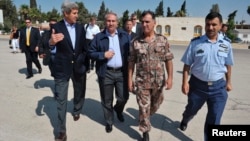The United States is trying to tamp down expectations for a quick resumption of peace talks between Israel and the Palestinians.
A U.S. State Department official said Thursday that despite some media reports, there currently are no plans to announce negotiations are back on.
The U.S. statement came as Palestinian President Mahmoud Abbas gathered senior Palestinian leaders in Ramallah to discuss the latest proposal from U.S. Secretary of State John Kerry. Kerry himself has shared few details of the plan to restart the talks, which last collapsed in 2010, though he said the two sides have managed to narrow their differences "very significantly."
Still, Israeli President Shimon Peres voiced hope Thursday that the peace process might resume soon.
"The latest news I have is that Secretary Kerry really made real progress and the chances for an understanding heightened. And this day, tomorrow, another day, are very crucial. It's touch and go, and I believe that the supreme efforts that the secretary made bear some fruits on both sides, on the Palestinian and the Israeli,'' said Peres.
Kerry met Wednesday in Amman with Jordanian officials and representatives of Arab states that support a comprehensive peace plan. Afterward at a news conference, he urged both Israel and the Palestinians not to take any actions that might undermine their progress.
Kerry spoke to reporters with Jordanian Foreign Minister Nasser Judeh, but refused to share many details on the proposed agreement to resume talks.
He did say that the plan aims to show the benefits of peace, and in particular, the impact some proposals could have on the Palestinian economy. He said programs being considered as part of the plan aim to "reduce the unemployment rate from 21 percent to 8 percent," and in three years "double the GDP [Gross Domestic Product] of all of the Palestinian territory."
Kerry has made reviving the Israeli-Palestinian talks one of his top priorities since becoming secretary of state earlier this year. During Wednesday's news conference, he said many of the Arab League ministers told him "the core issue of instability in this region and in many other parts of the world is the Palestinian-Israeli conflict."
A U.S. State Department official said Thursday that despite some media reports, there currently are no plans to announce negotiations are back on.
The U.S. statement came as Palestinian President Mahmoud Abbas gathered senior Palestinian leaders in Ramallah to discuss the latest proposal from U.S. Secretary of State John Kerry. Kerry himself has shared few details of the plan to restart the talks, which last collapsed in 2010, though he said the two sides have managed to narrow their differences "very significantly."
Still, Israeli President Shimon Peres voiced hope Thursday that the peace process might resume soon.
"The latest news I have is that Secretary Kerry really made real progress and the chances for an understanding heightened. And this day, tomorrow, another day, are very crucial. It's touch and go, and I believe that the supreme efforts that the secretary made bear some fruits on both sides, on the Palestinian and the Israeli,'' said Peres.
Kerry met Wednesday in Amman with Jordanian officials and representatives of Arab states that support a comprehensive peace plan. Afterward at a news conference, he urged both Israel and the Palestinians not to take any actions that might undermine their progress.
Kerry spoke to reporters with Jordanian Foreign Minister Nasser Judeh, but refused to share many details on the proposed agreement to resume talks.
He did say that the plan aims to show the benefits of peace, and in particular, the impact some proposals could have on the Palestinian economy. He said programs being considered as part of the plan aim to "reduce the unemployment rate from 21 percent to 8 percent," and in three years "double the GDP [Gross Domestic Product] of all of the Palestinian territory."
Kerry has made reviving the Israeli-Palestinian talks one of his top priorities since becoming secretary of state earlier this year. During Wednesday's news conference, he said many of the Arab League ministers told him "the core issue of instability in this region and in many other parts of the world is the Palestinian-Israeli conflict."





